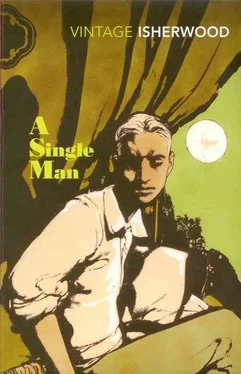As a matter of fact, Grant has recently performed at least one act of minor heroism. He has appeared in court as a defence witness for a bookseller caught peddling some grand old sex-classic of the twenties; it used to be obtainable only in the lands of the Latins but now, through a series of test-cases, it is fighting for its right to be devoured by American youth. (George can’t be absolutely sure if this is the same book he himself read as a young man, during a trip to Paris. At all events, he remembers throwing this or some other book just like it into the wastebasket, in the middle of the big screwing-scene. Not that one isn’t broad-minded, of course; let them write about heterosexuality if they must, and let everyone read it who cares to. Just the same, it is a deadly bore and, to be frank, a wee bit distasteful. Why can’t these modern writers stick to the old simple wholesome themes – such as, for example, boys?)
Grant Lefanu’s heroism, on this occasion, consisted in his defence of the book at the risk of his academic neck. For a very important and senior member of the STSC faculty had previously appeared as a witness for the prosecution and had guaranteed the book dirty, degenerate and dangerous. When Grant was called to the stand and cross-examined by the prosecuting attorney he begged, with his shy smile, to differ from his colleague. At length, after some needling and after having been cautioned three times to speak up, he blurted out a statement to the effect that it wasn’t the book, but its attackers who deserved the three adjectives. To make matters worse, one of the local liberal columnists gleefully reported all of this, casting the senior faculty-member as a reactionary old ass and Grant as a bright young upholder of civil liberty, and twisting his testimony into a personal insult. So now the question is, will Grant get his tenure prolonged at the end of the academic year?
Grant treats George as a fellow-subverter, a compliment which George hardly deserves, since, with his seniority, his licence to play the British eccentric and, in the last resort, his little private income, he can afford to say pretty much anything he likes on campus. Whereas poor Grant has no private income, a wife and three imprudently begotten children.
‘What’s new?’ George asks him, implying: What has the Enemy been up to?
‘You know those courses for police students? Today a special man from Washington is addressing them on twenty ways to spot a commie.’
‘You’re kidding!’
‘Want to go—? We might ask him some awkward questions.’
‘What time is it?’
‘Four-thirty.’
‘Can’t. I’ve got to be downtown in an hour.’
‘Too bad.’
‘Too bad,’ George agrees, relieved. He isn’t absolutely sure if this was a bona fide dare or not, however. Various other times, in the same half-serious tone, Grant has suggested that they shall go and heckle a John Birch Society meeting, smoke pot in Watts with the best unknown poet in America, meet someone high up in the Black Muslim movement. George doesn’t seriously suspect Grant of trying to test him. No doubt Grant really does do such things now and then, and it simply does not occur to him that George might be scared. He probably thinks George excuses himself from these outings for fear of being bored.
As they move down the counter, ending up with only coffee and salad – George watches his weight and Grant has an appetite as slender as his build – Grant tells about a man he knows who has been talking to some experts at a big firm which makes computers. These experts say that it doesn’t really matter if there’s a war, because enough people will survive to run the country with. Of course, the people who survive will tend to be those with money and influence, because they’ll have the better type of shelter, not the leaky death-traps which a lot of crooks have been offering at bargain prices. When you get your shelter built, say the experts, you should go to at least three different contractors, so nobody will know what it is you’re building; because, if the word gets around that you have a better-type shelter, you’ll be mobbed at the first emergency. For the same reason, you ought to be realistic and buy a sub-machine-gun. This is no time for false sentiment.
George laughs in an appropriately sardonic manner, since this is what Grant expects of him. But this gallows-humour sickens his heart. In all those old crises of the twenties, the thirties, the war – each one of them has left its traces upon George, like an illness – what was terrible was the fear of annihilation. Now we have with us a far more terrible fear, the fear of survival. Survival into a Rubble Age, in which it will be quite natural for Mr Strunk to gun down Grant and his wife and three children, because Grant has neglected to lay in sufficient stores of food and they are starving and may therefore possibly become dangerous and this is no time for sentiment.
‘There’s Cynthia,’ Grant says, as they re-enter the dining-room. ‘Want to join her?’
‘Do we have to?’
‘I guess so.’ Grant giggles nervously. ‘She’s seen us.’
And indeed Cynthia Leach is waving to them. She is a handsome young New Yorker, Sarah Lawrence-trained, the daughter of a rich family. Maybe it was partly to annoy them that she recently married Leach, who teaches history here. But their marriage seems to work quite well. Though Andy is slim and white-skinned, he is no weakling; his eyes sparkle sexily and he has the unaggressive litheness of one who takes a great deal of exercise in bed. He is somewhat out of his league socially, but no doubt he enjoys the extra effort required to keep up with Cynthia. They give parties to which everyone comes because the food and drink are lavish, thanks to Cynthia’s money, and Andy is popular anyhow and Cynthia isn’t that bad. Her only trouble is that she thinks of herself as an Eastern aristocrat slumming; she tries to be patrician and is merely patronising.
‘Andy stood me up,’ Cynthia tells him. ‘Talk to me.’ Then, as they sit down at her table, she turns to Grant. ‘Your wife’s never going to forgive me.’
‘Oh?’ Grant laughs with quite extraordinary violence.
‘She didn’t tell you about it?’
‘Not a word!’
‘She didn’t?’ Cynthia is disappointed. Then she brightens, ‘Oh, but she must be mad at me! I was telling her how hideously they dress the children here.’
‘But she agreed with you, I’m sure. She’s always talking about it.’
‘They’re being cheated out of their childhood,’ Cynthia says, ignoring this. ‘They’re being turned into junior consumers ! All those dreadful dainty little creatures, wearing lipstick! I was down in Mexico last month. It was like a breath of fresh air. Oh, I can’t tell you! Their children are so real. No anxiety. No other-direction. They just bloom —’
‘The only question is —’ Grant begins. Obviously, he is starting not to agree with Cynthia. For this very reason, he mumbles, he can barely be heard. Cynthia chooses not to hear him.
‘And then that night we came back across the border! Shall I ever forget it! I said to myself, either these people are insane or I am. They all seemed to be running , the way they do in the old silent newsreels. And the hostess in the restaurant – it had never struck me before how truly sinister it is to call them that. The way she smiled at us! And those enormous menus, with nothing on them that was really edible. And those weird zombie busboys, bringing nothing but glasses of water and simply refusing to speak to you! I just could not believe my own eyes. . . . Oh, and then we stayed the night at one of these ghastly new motels. I had the feeling that it had only just been brought from some place else, some factory, and set up exactly one minute before we arrived. It didn’t belong anywhere . I mean – after all those marvellous old hotels in Mexico – each one of them is really a place – but this was just utterly unreal —’
Читать дальше












